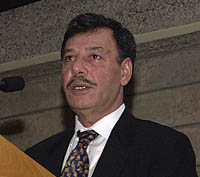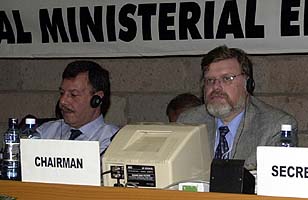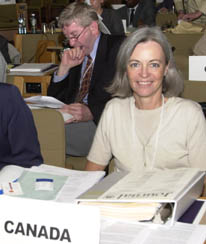 
|
|
|
21st Session of the UNEP Governing Council Nairobi,
KENYA |
|
|
| monday 05 | tuesday 06 | wednesday 07 | thursday 08 | friday 09 |summary | |
|
Wednesday 07 February 2001
Delegates met in parallel sessions of the Plenary and the Committee of the Whole (COW). The Plenary addressed governance and the chemicals agenda. The COW considered UNEP's subprogrammes and related draft decisions, forwarding numerous decisions to the drafting group, which met throughout the day. A working group on budget matters also convened.
|
|
|||||||||||||||||||||||||||||||||||
|
|
||||||||||||||||||||||||||||||||||||
|
COMMITTEE OF THE WHOLE Environmental assessment on early warning, policy development and implementation:
The COW resumed consideration of draft decisions related to UNEP's subprogrammes on environmental assessment and early warning, policy development and law, and policy implementation. On the draft decision on the environmental emergency prevention, preparedness, assessment, response and mitigation, SWITZERLAND proposed identifying gaps in civil liability regimes and supporting existing efforts on assessing non-economic liability compensation under the Convention on Biological Diversity (CBD). CANADA expressed concern regarding quantification of non-economic costs. CHINA proposed an environmental emergencies fund for developing countries. The draft decision was forwarded to the drafting group. On the Programme for the Development and Periodic Review of Environmental Law for the First Decade of the Twenty-first Century, EGYPT expressed concerns over the limited representation by developing countries' legal experts on the Montevideo III Programme relating to environmental law. She proposed text calling for a review the implementation of the Programme by 2002, rather than 2005. CANADA, the US and AUSTRALIA opposed this, and the COW adopted the decision without amendment. On policy and advisory services in key areas of institution building, the EU called for elaboration of text on public access to information.
The COW referred the text to the drafting group. Delegates then considered text on draft guidelines on compliance with international environmental agreements and on effective national environmental enforcement and international cooperation in combating environmental crime. CHINA, with COLOMBIA and EGYPT, expressed concern over compliance guidelines, the implications of enforcement guidelines on national sovereignty, and lack of clarity on the term "environmental crime." JAPAN and NORWAY noted the utility of guidelines on compliance. Several delegates said the original text considered by the Committee of Permanent Representatives (CPR) enjoyed more support than the current text, and both draft text were forwarded to the drafting group. On the role of civil society, the EU highlighted the significance of civil society partners. NORWAY proposed the establishment of an ad hoc NGO committee. CANADA, supported by US, ANTIGUA AND BARBUDA, INDIA and AUSTRALIA expressed concern that establishing an ad hoc NGO committee assumed a forgone conclusion of the consultative process. The draft decision was forwarded to the drafting group.
|
||||||||||||||||||||||||||||||||||||
Regional cooperation and representation : UNEP Deputy Executive Director Kakakhel introduced the subprogramme on regional cooperation and representation and its related draft decision linked on Support to Africa. The EU supported UNEP's strengthened role in this area, and suggested text linking poverty and the environment. Several developing countries supported language on additional financial resources relating to developing country preparation for and participation in UNFCCC COP-7 and the World Summit on Sustainable Development. The draft text was referred to the drafting group, along with the suggested amendments. |
||||||||||||||||||||||||||||||||||||
|
Environmental conventions:
The COW then considered a number of decisions relevant to UNEP's subprogramme on environmental conventions. The COW adopted draft decisions on the status of international conventions and protocols in the field of the environment, and on establishment of a new regional seas programme for the East Central Pacific region. On atmosphere and climate issues, the EU and others expressed concern at text on adverse impacts of response measures under the UNFCCC and the Kyoto Protocol, given the status of climate negotiations. The issue was referred to the drafting group. Other draft decisions referred to the drafting group following proposals by Parties related to: coral reefs; biosafety; and strengthening of regional seas programmes. |
||||||||||||||||||||||||||||||||||||
|
PLENARY: Governance:
UNEP Executive Director Klaus Töpfer introduced the issues related to global environmental governance and UNEP, and said the World Summit on Sustainable Development should review requirements for strengthened institutional structures for governance. CANADA reported on an informal meeting that had discussed its proposal to establish an eminent experts' panel on governance. JAPAN and EGYPT said consideration of environmental governance must be conducted in the broader context of sustainable development. The US said lack of adequate time and resources precluded the establishment of an eminent persons panel, and preferred the enhancement of existing structures, and supported dissolution of the HLCOM. EGYPT and MAURITIUS opposed establishing any new organization or institution on governance. The EU, with MAURITIUS, said governance should be strengthened, but must build on existing institutions. NORWAY supported an improved environmental institutional architecture that is optimal, reviewed and strengthened regularly and conducted as an intergovernmental process that integrates external expertise. The EU said an ad hoc intersessional working group could address strengthening international environmental governance in preparation for the Summit. |
||||||||||||||||||||||||||||||||||||
|
Panel on Chemicals:
In the afternoon, Plenary held a panel discussion on the Chemicals Agenda. Executive Director Klaus Töpfer congratulated POPs Chair John Buccini on successfully completing the POPs negotiations. Jim Willis, Director of UNEP Chemicals, addressed the historical development of chemical management. John Buccini elaborated on the structure, aims and objectives of the POPs convention. Swedish Environment Minister Kjell Larsson expressed EU support for UNEP's work on chemicals and said the precautionary principle must be a central element in any chemical strategy. Lynn Goldman, Johns Hopkins University, spoke of adverse impacts of POPs on the development of children. Henrique Cavalcanti, President of the Intergovernmental Forum on Chemical Safety (IFCS), described the IFCS as the overarching mechanism for international cooperation on chemical safety. Discussions proposed centralizing the three chemical conventions in Geneva to promote synergies and avoid duplication. Other issues such as assistance to Africa, global assessments of heavy metals, and chemicals management. The establishment of a working group to set priorities and provide clear direction to UNEP on future steps was supported by many delegations, and Executive Director Töpfer said he would recommend this proposal to the Council's bureau. |
||||||||||||||||||||||||||||||||||||
|
|
||||||||||||||||||||||||||||||||||||
|
|
SIDE EVENTS: |
|||||||||||||||||||||||||||||||||||
|
UNEP / ICRAF Agroforestry site groundbreaking:
|
||||||||||||||||||||||||||||||||||||
|
UNEP Executive Director & GC President's Reception:
|
||||||||||||||||||||||||||||||||||||
|
|
||||||||||||||||||||||||||||||||||||
|
Relevant Information:
Past IISD Coverage:
|
||||||||||||||||||||||||||||||||||||
|
|
||||||||||||||||||||||||||||||||||||













